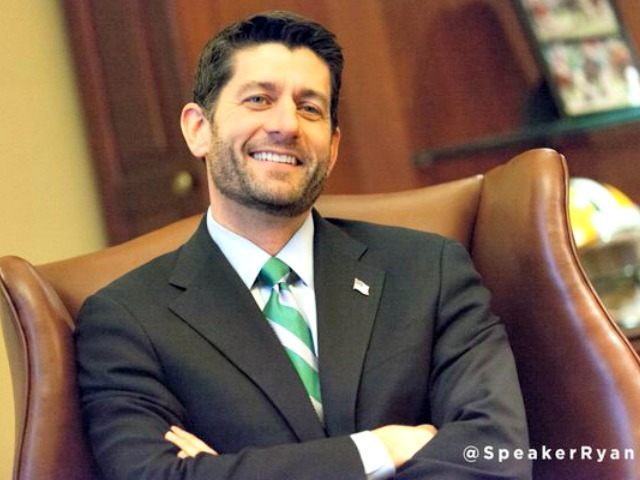The December $1.8 trillion tax and spending deals, negotiated by House Speaker Paul Ryan, will increase the federal government’s 2016 deficit by $130 billion, according to a new report by the Congressional Budget Office.
The deal also pushed the size of the federal debt to 76 percent of GDP by the end of 2016, a full 2 percentage points higher than 2014, confirming what many conservatives feared at the end of 2015.
The full-year deficit for 2016 is $544 billion, equalling 2.9 percent of the economy.
The expected shortfall is the first time the deficit has increased, relative to the economy, since 2009.
In other words, the first spending blueprint passed with Republicans — led by Ryan — in complete control of Congress actually increased the deficit more than Democrat spending plans.
The non-partisan CBO, whose director is hired by the Republican majority, made clear what caused the spike in the projected deficit.
The 2016 deficit that CBO currently projects is $130 billion higher than the one that the agency projected in August 2015. That increase is largely attributable to legislation enacted since August—in particular, the retroactive extension of a number of provisions that reduce corporate and individual income taxes.
Worse, however, is the future spending outlined in the Republican budget. According to the Ryan spending plan, the size of the federal deficit will double over the next decade, nearing an annual hole equal to 5 percent of the size of the economy.
Over the next decade, Ryan’s budget will add $9.4 trillion to the nation’s fast-growing debt.
Overall, federal spending this year will increase 6 percent over last year, around three times the rate of inflation. A significant factor in the increased federal spending is a 14 percent jump in interest payments on the existing debt. Even this higher spending on net interest, however, is still well below the 50-year average. If the level of interest payments return to their historic levels, federal spending will spike even further.
One other bit of caution in the latest CBO report has to do with economic projections. The deficit and debt assumptions are based on the economy growing 2.7 percent this year and 2.5 percent in 2017. In later years, CBO projects an average growth rate of 2 percent.
Given current economic headwinds, these projections seem overly optimistic. If growth is lower in the near or longer term, than the relative sizes of the deficit and debt will go up even further.
Republicans in Washington often caution conservatives that, without control of the White House, party leaders have little room to maneuver on the budget. Recent experience puts a lie to this caution, however.
In 2011, after the Republicans had captured the House, but Democrats kept control of the Senate, in addition to the White House, Republican leaders secured across-the-board spending cuts, i.e. sequestration, that reduced actual current spending and lowered the deficit.
Since taking control of both chambers of Congress, however, Republican leaders have eliminated the across-the-board cuts and enacted retroactive tax cuts without accompanying spending cuts.
Republicans, in other words, have had less success curtailing spending, and, arguably, have boosted spending faster than when Democrats were in charge of Congress, since the party took control of the US Senate.
The last time Republicans controlled all branches of government was during the Bush presidency. Specifically, between 2000 and the end of 2006, Republicans controlled all aspects of the federal purse strings. In that time, the federal debt ballooned by 60 percent. It should be noted that this period coincided with a time of economic expansion, prior to the Great Recession.
It is very likely that Republicans will win the White House this November. They are almost certain to retain their House majorities. The CBO report, and the experience of the Bush years, suggests conservatives should perhaps hope that Republicans lose control of the Senate.
Republicans don’t have the White House yet, but Speaker Ryan and Leader McConnell have already returned to the party’s free-spending ways.

COMMENTS
Please let us know if you're having issues with commenting.